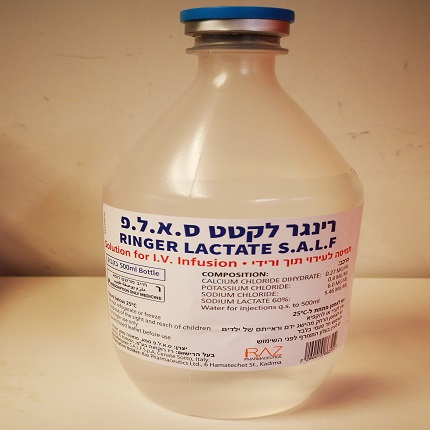Quest for the right Drug

רינגר לקטט ס.א.ל.פ RINGER LACTATE S.A.L.F (CALCIUM CHLORIDE DIHYDRATE, POTASSIUM CHLORIDE, SODIUM CHLORIDE, SODIUM LACTATE)
תרופה במרשם
תרופה בסל
נרקוטיקה
ציטוטוקסיקה
צורת מתן:
תוך-ורידי : I.V
צורת מינון:
תמיסה לאינפוזיה : SOLUTION FOR INFUSION
עלון לרופא
מינוניםPosology התוויות
Indications תופעות לוואי
Adverse reactions התוויות נגד
Contraindications אינטראקציות
Interactions מינון יתר
Overdose הריון/הנקה
Pregnancy & Lactation אוכלוסיות מיוחדות
Special populations תכונות פרמקולוגיות
Pharmacological properties מידע רוקחי
Pharmaceutical particulars אזהרת שימוש
Special Warning עלון לרופא
Physicians Leaflet
Overdose : מינון יתר
4.9. Overdose An excessive volume or too high a rate of administration of Ringer Lactate S.A.L.F may lead to fluid and sodium overload with a risk of oedema (peripheral and/or pulmonary), particularly when renal sodium excretion is impaired. In this case, extra renal dialysis may be necessary. Excessive administration of potassium may lead to the development of hyperkalaemia, especially in patients with renal impairment. Symptoms include paresthesia of the extremities, muscle weakness, paralysis, cardiac arrhythmias, heart block, cardiac arrest, and mental confusion. Excessive administration of calcium salts may lead to hypercalcaemia. Symptoms of hypercalcaemia may include anorexia, nausea, vomiting, constipation, abdominal pain, muscle weakness, mental disturbances, polydipsia, polyuria, nephrocalcinosis, renal calculi, and, in severe cases, cardiac arrhythmias and coma. Too rapid intravenous injection of calcium salts may also lead to many of the symptoms of hypercalcaemia as well as to chalky taste, hot flushes, and peripheral vasodilatation. Mild asymptomatic hypercalcaemia will usually resolve on stopping administration of calcium and other contributory drugs such as vitamin D. If hypercalcaemia is severe, urgent treatment (such as loop diuretics, haemodialysis, calcitonin, bisphosphonates, trisodium edetate) is required. Excessive administration of lactate may lead to metabolic alkalosis. Metabolic alkalosis may be accompanied by hypokalaemia. Symptoms may include mood changes, tiredness, shortness of breath, muscle weakness, and irregular heartbeat. Muscle hypertonicity, twitching, and tetany may develop especially in hypocalcaemic patients. Treatment of metabolic alkalosis due to bicarbonate overdose consists mainly of appropriate correction of fluid and electrolyte balance. Replacement of calcium, chloride, and potassium may be of particular importance. When overdose is related to medications added to the solution infused, the signs and symptoms of over infusion will be related to the nature of the additive being used. In the event of accidental over infusion, treatment should be discontinued and the patient should be observed for the appropriate signs and symptoms related to the drug administered. The relevant symptomatic and supportive measures should be provided as necessary.

שימוש לפי פנקס קופ''ח כללית 1994
לא צוין
תאריך הכללה מקורי בסל
01/01/1995
הגבלות
תרופה מוגבלת לשימוש בבתי חולים או אשפוז יום
מידע נוסף
